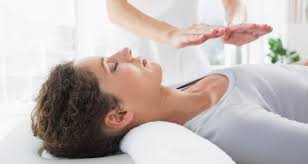

Reiki Session
May 15, 2020 @ 8:00 am - 5:00 pm
| €60Reasons people have Reiki treatments:
- To increase their energy and vitality levels
- To improve health and well-being.
- To reduce stress
- To help during times of change
- To be supported in times of bereavement
- To accelerate the healing process after surgery
- To accelerate the healing process with orthopedic injuries
- As a method of preventative health care and health maintenance.
- To treat oneself to a deeply relaxing treatment.
- To reduce pain.
- To increase confidence and self esteem.
A Reiki Treatment is a deeply relaxing non intrusive treatment. Your Reiki practitioner will complete a client consultation form with you and explain how Reiki works.
Reiki is non-intrusive. The client always remains fully clothed during a treatment. The Reiki practitioner follows a sequence of hand positions over the body. The practitioner channels universal life force energy to the Client.
The Reiki energy the client receives is not the Practitioner’s personal energy. The Reiki Practitioner has been trained in how to facilitate the flow of this energy to others during their Reiki training.
Generally, clients can feel a deep sense of relaxation, heat, tingling, coolness and energy flowing during a Reiki treatment. Reiki will flow to where your body needs it. Many people go into a deep relaxed state during the treatment. Usually a Reiki treatment lasts one hour. Someone who has a chronic condition is usually advised to have a weekly Reiki treatment for four to six weeks for the energy to build up in the system. Treatments can then be reviewed by the client and practitioner. People with acute conditions may notice lasting improvements after two treatments. No two treatments are the same, as Reiki works on physical, mental, emotional and spiritual levels.
People who want relief from an acute condition or an acute exacerbation of an existing condition may notice results quicker than a person presenting with a chronic condition.
It is highly recommended to have Reiki Treatments to maintain health when you are well. As Reiki helps to boost your immune system and reduce stress, regular Reiki treatments are a great way to maintain your health. A Reiki treatment every now and again is a lovely way of not just treating yourself, but being healthier.
What might I experience?
“I feel very refreshed and seem to be thinking more clearly.” “I think I fell asleep.” “I can’t believe how hot your hands got!” “I feel more relaxed than even after a massage.” “My headache is gone.” These are some of things people typically say after a Reiki session.
The experience of Reiki is subjective, changeable, and sometimes very subtle. People often experience heat in the practitioner’s hands, but sometimes the practitioner’s hands feel refreshingly cool. Other common experiences are subtle pulsations where the practitioner’s hands are placed or cascading waves of pulsations throughout the body.
People often comment how comforting they find the experience of Reiki to be. An interesting study reported that recipients frequently feel that they are hovering in a threshold state of consciousness, simultaneously aware of their surroundings and deeply indrawn. Some people fall into a deep, sleeplike meditative state. Sometimes the experience of Reiki is dramatic, while for other people, the first session in particular may be uneventful, although they feel somehow better afterward. The most common experience is an almost immediate release of stress and a feeling of deep relaxation.
What should I do during the session?
Not much, but here are a few suggestions:
- If you have music that you particularly enjoy and which is relaxing, bring it to your session and ask the practitioner to play it. You can also request silence if you prefer.
- Use the rest room before your session so that you are able to lie down comfortably.
- Let the practitioner know your needs before you start. For example, if you have trouble breathing and lying flat is uncomfortable, say so. Or mention if you have had surgery recently and don’t want to be touched where the scar is still tender (the practitioner can float her hand here). If you are pregnant or have digestive complaints, it may not be feasible to lie on your stomach. Inform your practitioner.
As the session progresses, you will feel more relaxed. If you become uncomfortable, you can adjust your position at any time. Be sure to ask for anything that will add to your comfort, such as additional support under your knees or a blanket. This is your special time and your practitioner is there to help you.
Receiving Reiki is a wonderfully passive experience. Don’t try to relax, just let the Reiki relax you. Your state will shift quite naturally as the session proceeds. Meanwhile feel free to daydream, enjoy the music, or simply observe your breath or the sensations of the therapy.
What happens after the session?
Do not expect a diagnosis, as that is not part of Reiki. Some practitioners may make common sense suggestions for after-care, such as drinking water and following your body’s needs.
Although people typically leave a Reiki session feeling refreshed, sometimes they notice feeling more tired in the evening than usual. This is not viewed as an adverse reaction, but rather as the body’s natural healing response, something to be heeded. People commonly report a sense of calm and mental clarity and sleeping well after Reiki.
How many sessions should I receive?
Your practitioner may suggest a series of sessions. Four sessions is a traditional recommendation and gives you time to evaluate what benefits you are receiving. Discuss with your practitioner how best to space the sessions to suit your needs and your schedule.
In the presence of a serious health challenge, Reiki practitioners often recommend four sessions over four days. These need not be given by the same practitioner.
